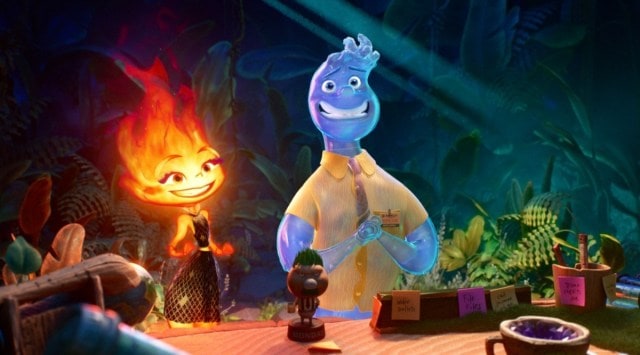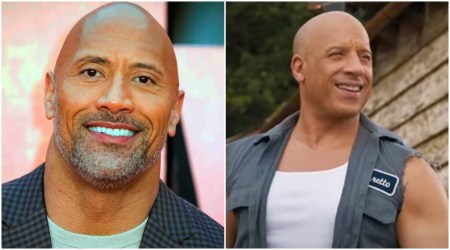Pixar’s Elemental falls flat, adding to worries about the brand
Questions about Pixar’s health have swirled in Hollywood and among investors since last June, when the Disney-owned studio released Lightyear to disastrous results.
 Elemental is the latest Pixar release.
Elemental is the latest Pixar release.Written by Brooks Barnes
Pixar is damaged as a big-screen brand.
That was one of the rather glum takeaways from the weekend box office, which found “Elemental,” a $200 million-plus Pixar original, arriving to a disastrous $29.5 million in domestic ticket sales. “The Flash,” a Warner Bros. superhero spectacle that cost about $200 million, also struggled, taking in a lethargic $55.1 million, according to Comscore, which compiles ticketing data.
“Hard to sugarcoat this,” said David A. Gross, a film consultant who publishes a newsletter on box office numbers.
Questions about Pixar’s health have swirled in Hollywood and among investors since last June, when the Disney-owned studio released “Lightyear” to disastrous results. How could Pixar, the gold standard of animation studios for nearly three decades, have gotten a movie so wrong — especially one about Buzz Lightyear, a bedrock “Toy Story” character?
Maybe pandemic-worried families were not quite ready to return to theaters. Or maybe, as some box office analysts speculated, Disney had weakened the Pixar brand by using its films to build the Disney+ streaming service. Starting in late 2020, Disney debuted three Pixar films in a row (“Soul,” “Turning Red” and “Luca”) online, bypassing theaters altogether.
By streaming standards, those three movies were runaway hits. But Pixar’s most-recent box office success was in 2019, when “Toy Story 4” took in $1.1 billion worldwide.
Attendance for “Elemental” over the weekend reinforced the brand problem hypothesis: It was Pixar’s worst opening-weekend result ever in the United States and Canada. The previous bottom was “Onward,” which arrived to $39 million ($46 million after adjusting for inflation) in domestic ticket sales in March 2020, just as the coronavirus pandemic started to sweep the globe.
“Elemental,” a cross-cultural girl-meets-boy romantic comedy, took in an additional $15 million in limited release overseas, Disney said.
To reestablish Pixar movies as more than just Disney+ food, the company held a premiere for “Elemental” at the Cannes Film Festival and a premiere in Los Angeles at the Academy Museum of Motion Pictures. “We’ve trained audiences that these films will be available for you on Disney+,” Pete Docter, Pixar’s chief creative officer, said on Friday in an interview with Variety, a trade news outlet. “We’re trying to make sure people realize there’s a great deal you’re missing by not seeing it on the big screen.”
Films based on original stories are becoming harder sells, especially at a time when going to the movies has become more expensive and the broader economy is unsettled. People want to know that spending the money will be worth it. The animated movies that have been succeeding have been based on established characters and franchises.
“If you don’t swing for original stories you can’t make new franchises, and we swung really hard,” said Tony Chambers, Disney’s executive vice president of theatrical distribution. Referring to intellectual property, he added, “Original IP needs to work a lot harder to break through nowadays.”
Families turned out in colossal numbers for “The Super Mario Bros. Movie” (Universal) in April and “Spider-Man: Across the Spider-Verse” (Sony) earlier this month. Family moviegoing budgets may be used up at this point, and movie watchers know they will be able to catch “Elemental” before long at home.
Some people in Hollywood and on Wall Street also worry that Pixar’s once-dazzling creative spark has started to flicker. The studio has suffered brain drain; it eliminated 75 jobs last month as part of Disney-wide layoffs and cost cuts. (“Lightyear” director Angus MacLane, a 26-year Pixar veteran, was among those who received a pink slip.) Pixar has also been pushed to expand into television production to keep the Disney+ shelves stocked. “The higher the volume, the lower the quality,” said Terry Press, a former Disney, DreamWorks and CBS Films executive.
Reviews for “Elemental” were mostly positive, although to a lesser degree than normal for a Pixar release. Ticket buyers gave it an A grade in CinemaScore exit polls. The “audience score” on Rotten Tomatoes stood at a sky-high 91% positive on Sunday morning.
In a statement, Disney said the positive reviews “set us up for a strong theatrical run through the school holiday period.” The next major animated film for families is “Teenage Mutant Ninja Turtles: Mutant Mayhem” (Paramount), which does not arrive in theaters until Aug. 2.
“The Flash” (Warner Bros.) received weaker reviews and a chillier audience response — ticket buyers gave it a B in CinemaScore exit polls — but filled enough seats to rank as the No. 1 movie in the United States and Canada. The movie finds the titular superhero using his powers to travel back in time, accidentally causing mayhem. Batman and Supergirl also figure prominently.
In part, “The Flash” suffered from timing: It was delayed by the pandemic, finally arriving at a moment when late night shows — crucial movie marketing platforms — are shut down because of a strike by show writers. Warner Bros. and its DC Studios division have also cited superhero fatigue as an explanation for the recent underperformance of a string of their comics-based movies, including “Shazam! Fury of the Gods” and “Black Adam.”
Ezra Miller, who played the Flash, became a divisive figure following offscreen legal troubles and erratic behavior in 2021 and 2022. (The actor, who is nonbinary, issued an apology last year and said they were seeking mental health treatment. They largely did not do publicity for “The Flash.”)
“The superhero world is fantasy, escapist fun,” Gross said. “Everybody has to play along. This didn’t help.”





































